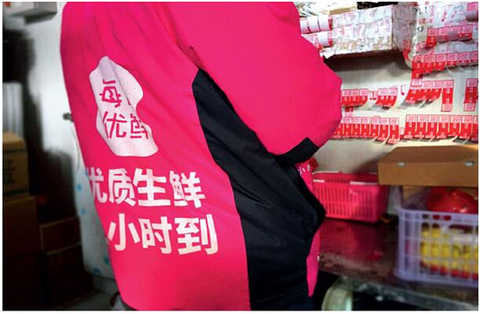
Daily Fresh is the first fresh e-commerce company to achieve regional profitability in Beijing. Photograph of Hu Jin, photojournalist of China Economic Weekly
"China Economic Weekly" reporter Cheng Ziyan | Shanghai Report
(This article was published in China Economic Weekly, Issue 8, 2017)
Recently, Daily Fresh announced the completion of the $100 million Series C financing. This round of financing was led by Lenovo Venture Capital and Zheshang Venture Capital's management fund, Tencent, South Korea KTB, Yuanyi, Huachuang Capital and investment, of which Tencent has invested in three consecutive rounds of daily fresh.
The financing was referred to by the industry as the “first order†for fresh financing in 2017. It was also in the past 2016, when the fresh e-commerce experienced a wave of bankruptcy, layoffs, closing stores and other low tides. The industry is good.
The “Fresh E-commerce†that was once placed on the “last piece of fat in the e-commerce fieldâ€, after the big reshuffle in 2016, what is the current pattern? Will you continue to shuffle in 2017?
Big players and giants such as BAT
In the fresh food industry, “daily good fresh food†should be regarded as “a rising starâ€. Compared with the "predecessors"'s "Frost, thorns and thorns", the daily development of fresh and good is much smoother. In 2016, Daily Fresh announced that it was the first fresh e-commerce company to achieve regional profitability in Beijing.
The reason why the daily good is developing well is largely because Tencent has “protected†since birth. Tencent seems to have high hopes for daily goodness and has invested three times in a row.
Looking back at 2016, in the fresh industry war, whether it is fresh "predecessors" or "senior generations", it seems that they are looking for giants to "do the backing."
In the field of fresh e-commerce, Tiantian Orchard has completed the most round of financing so far - in August 2016, it has received Zhangjiang Hi-Tech's $100 million Series D financing. As the “elder†of fresh e-commerce, Tiantian Orchard was ranked first in the field of vertical fresh e-commerce in the ranking of fresh e-commerce in 2015. At that time, Wang Wei, CEO of Tiantian Orchard, did not expect that the “first movers†in the fresh-keeping field in 2016 would fall. First, in April 2016, the “Delicious Seven Seven†with Amazon Investment announced the collapse of the capital chain, and then the O2O local life service e-commerce youth restaurant announced the collapse, and the O2O model of the daily orchard almost collapsed in 2016.
At the beginning of 2016, relying on Jingdong to build a cold chain system, Tiantian Orchard tried to transform O2O based on the experience store layout in Beishang Guangshen. However, the Tianyuan Orchard has no offline experience at all, and only closed all the offline stores in Beijing and most of the stores in Shanghai.
As a heavy chess in the field of Ali's fresh-keeping, easy-to-fruit fresh is much more stable under the layout line. In 2016, after receiving the largest investment in the fresh industry led by Suning - 500 million US dollars, and fully taking over the operation rights of Su Ning's fresh plate "Su Xiansheng", Yi Guosheng was born in December 2016 with a price of 950 million Hong Kong dollars. It has become the second largest shareholder of Lianhua Supermarket, one of the largest chain retailers in China, with a layout of “new retailâ€.
iResearch's "2016 China Fresh E-commerce Industry Research Report" believes that: Internet giants have huge capital and flow advantages, have the needs of layout fresh market, but lack professional talents and supply chain management; vertical fresh e-commerce has high Professionalism and supply chain advantages, but lack of funding and flow support. The cooperation between vertical fresh e-commerce and Internet giants is a complementary and win-win choice.
According to the statistics of the reporters of China Economic Weekly, after the giants in the fresh-keeping industry in 2016, through mergers and acquisitions, integration, Tencent + Daily Excellent, Jingdong + Tiantian Orchard + Yonghui, Ali + Easy Fruit Network + Box Ma Xiansheng, Baidu + COFCO I bought the ecosystem of the network.
"Little players" patiently build their own characteristics
According to statistics, only 1% of the more than 4,000 fresh e-commerce companies in the country are profitable, 4% are flat, 88% are losing money, and the remaining 7% is a huge loss.
How do small players who don’t have BAT and other giants “escort†seek their own place in the fresh industry?
Shanghai local fresh-keeping e-commerce company stewards told China Economic Weekly that they just wanted to be a third-party fresh e-commerce platform, so that agricultural products lacking sales channels were sold through this platform, but found in the course of operation. The quality is uneven, and upstream agricultural distributors and growers are too complicated. Therefore, the vegetable steward established its own agricultural production base, and formulated standards for agricultural product quality, packaging, etc., to control product quality from the source of the supply chain.
Song Yuqin, deputy general manager of Caiguan e-commerce, told the China Economic Weekly: "The standardization of the supply side of agricultural products is still in its infancy, which is the main reason that seriously restricts the efficient operation of the middle and lower chain of the whole fresh industry. The second and third productions were severely diverted. The deep integration of the first, second and third productions is the only way to effectively solve the pain points of the whole fresh industry."
Through the establishment of its own agricultural production base, since January 2017, the vegetable stewards have been boosted by the high-frequency year-end and the peak of residents' purchases. The sales data of e-commerce has increased by 200%~300%.
Jialebao E-Commerce Co., Ltd. (hereinafter referred to as "Jialebao"), which has acquired the delicious seven-seven-year-old, believes that the cake in the fresh-keeping field is big enough, just to take it slowly. Beginning in 2013, it was piloted from a small town in Pudong, Shanghai. After that, a town in a small town began to expand, and it gradually covered the Pudong District. Until 2016, Jialebao completed the full coverage of Shanghai. At the beginning of its establishment, Jialebao decided that there would be no distribution starting point, and one onion and one potato would be delivered to the home; it promised not to receive the delivery fee, unconditional replenishment, unconditional replacement and other service requirements.
Jia Lebao CEO Gao Bibu said in an interview with China Economic Weekly: "The fresh industry is not going to get up, because the fresh industry is particularly heavy, and it needs to build logistics, build cold chain, build warehouses, etc. A lot of human capital. Be patient with fresh food."
2017 will be the critical point of explosive growth
The fresh field seems to be picking up. Recently, Jingdong's data show that during the Spring Festival of 2017, the sales of fresh goods on the platform increased by 4 times year-on-year, and the increase in imported fresh sales was more than 14 times.
Alibaba's data also shows that the proportion of fresh foods is increasing year by year in the purchase of ingredients, and the increase of fresh fruits and fresh vegetables is particularly significant.
Although Tiantian Orchard refused to disclose specific data, CEO Wang Wei told the China Economic Weekly reporter that “the Spring Festival, Lantern Festival, and the Orchard have all achieved very good results in all aspects, and have grown substantially year-on-year. ."
According to the data released by iResearch, in 2016, the overall transaction volume of domestic fresh e-commerce is about 90 billion yuan, 80% more than the 50 billion yuan in 2015. It is estimated that the overall market size in 2017 will reach 150 billion yuan.
At the same time, most people in the industry have predicted that fresh e-commerce will usher in an outbreak in 2018, and every day orchard and easy fruit fresh are expected to reach breakeven in 2018.
According to the "Report", among the users of fresh e-commerce, 26 to 35 years old and 36 to 45 years old accounted for the highest proportion. After 70 and 80, they were gradually accepted and used to online shopping. The industry believes that fresh food itself has strong characteristics of household consumption. As more and more grow up on the Internet, and even play the Internet, and after the pursuit of higher quality life, gradually enter the family after 90, 00, When the development of fresh e-commerce is mature, users and demand will usher in explosive growth.
Wang Wei told the China Economic Weekly reporter: "The online penetration rate of the fresh food industry is only about 1%. If you want to go to 10%, there is more work to be done and more patience."
At the same time, Wang Wei predicts that in 2017, it will be the critical point for the explosive growth of the fresh industry, but the entire industry will continue to shuffle, and it is expected to leave three to five families to survive. Speculative companies without a supply chain base will be eliminated.

Cover of the 8th issue of China Economic Weekly in 2017
China Economic Weekly-Economic Network copyright works must be authorized and dated when reprinted, and offenders will be held liable.
Knitted Fabric,Christmas Pattern Polyester Fabric,Flow Mark Fabric,Ribbing Blue Fabric
Shaoxing Weihui International Trade Co.,Ltd. , https://www.weihuifabric.com
![<?echo $_SERVER['SERVER_NAME'];?>](/template/twentyseventeen/skin/images/header.jpg)